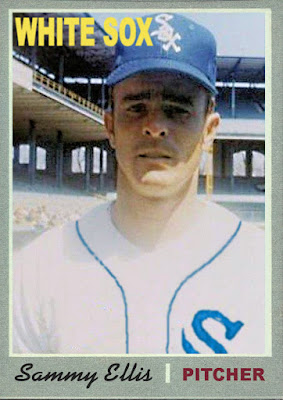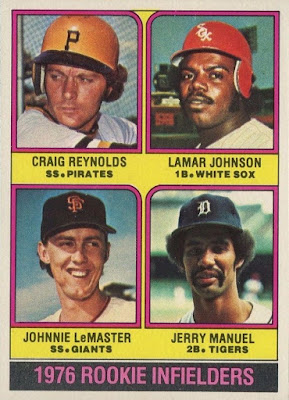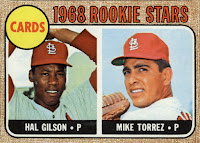It's been a while since my last post and the random number generator picked a 4-player rookie card. That means I will be making up for lost time with a nice long post. This one is from 1975 and features two future All-Stars.
**************************************************
 The first player on this card is Mike Cubbage. Cubbage was a versatile infielder who was drafted by the Washington Senators in 1971. He made his MLB debut in April of 1974, two years after the Senators became the Texas Rangers. After going hitless in his first fifteen at bats he was sent back down to the minors. In 1975 he fared a little better hitting .224 in 58 games.
The first player on this card is Mike Cubbage. Cubbage was a versatile infielder who was drafted by the Washington Senators in 1971. He made his MLB debut in April of 1974, two years after the Senators became the Texas Rangers. After going hitless in his first fifteen at bats he was sent back down to the minors. In 1975 he fared a little better hitting .224 in 58 games.In 1976 he was part of the trade that sent future Hall of Famer Bert Blyleven to the Rangers. Texas bundled him with Roy Smalley, Jim Gideon, and Bill Singer in exchange for Blyleven and Danny Thompson. Cubbage would spend 5 seasons in the Twin Cities used mostly as the third baseman.
 In 1978 Cubbage performed one of the rarest feats in baseball, he hit for the cycle on this day 38 years ago. In his first at bat Cubbage drove a ball deep to right and was thrown out at third base. He was credited with a double. In his next at bat he hit a two run homer. The very next inning he had an infield single. In the bottom of the 7th he tripled with two men on to complete the cycle. In 1977 he nearly had a cycle, completing the tougher tasks but missing just a single.
In 1978 Cubbage performed one of the rarest feats in baseball, he hit for the cycle on this day 38 years ago. In his first at bat Cubbage drove a ball deep to right and was thrown out at third base. He was credited with a double. In his next at bat he hit a two run homer. The very next inning he had an infield single. In the bottom of the 7th he tripled with two men on to complete the cycle. In 1977 he nearly had a cycle, completing the tougher tasks but missing just a single.
For his Card That Never Was, I gave him this 1976 Topps Traded card despite the fact that the trade took place in June of 1976 well after Topps went to print.
**************************************************
 Doug DeCinces was drafted by the Orioles in 1970 and made his debut in 1973. As a third baseman for a club that boasted one of the best ever in Brooks Robinson, it was 1976 before DeCinces became a regular in the Orioles lineup. In 1982 he was dealt to the Angels for "Disco" Dan Ford in order to make room for another Hall of Famer, Cal Ripken Jr..
Doug DeCinces was drafted by the Orioles in 1970 and made his debut in 1973. As a third baseman for a club that boasted one of the best ever in Brooks Robinson, it was 1976 before DeCinces became a regular in the Orioles lineup. In 1982 he was dealt to the Angels for "Disco" Dan Ford in order to make room for another Hall of Famer, Cal Ripken Jr..California got the better of that deal as DeCinces had a career year in 1982 with personal bests in Hits, Doubles, Triples, HRs RBIs and Batting Average. He earned a Silver Slugger award and was 3rd in AL MVP voting behind two Hall of Famers Robin Yount and Eddie Murray. In 1983 he made his only All Star appearance.
 In September of 1987 he was released by the Angels and spent the final four games of 1987 in a Cardinals uniform. In 1988 he was signed by the Tokyo Yakult Swallows. He played first base for the Swallows and hit .244 with 19 homers in a season that was cut short due to career ending back injuries. For his Card That Never Was, I made this 1988 Topps Style card of DeCinces playing for the Yakult Swallows.
In September of 1987 he was released by the Angels and spent the final four games of 1987 in a Cardinals uniform. In 1988 he was signed by the Tokyo Yakult Swallows. He played first base for the Swallows and hit .244 with 19 homers in a season that was cut short due to career ending back injuries. For his Card That Never Was, I made this 1988 Topps Style card of DeCinces playing for the Yakult Swallows.DeCinces actually had a card in the 1988 set that showed him as an Angel but had an O-Pee-Chee-esque "Now With Cardinals" stamped on the front of the card. Score and Sportsflics also showed him in a Angels uniform on their 1988 cards. Fleer was only card company to show DeCinces in a Cardinals uniform in 1988.
**************************************************
 This is not the Reggie Sanders most baseball fans are familiar with. This Reggie Sanders was originally drafted by the Kansas City A's in 1967. The other Reggie Sanders was born in 1967. This was not even this Reggies first rookie card. He also appeared in the 1974 Topps set along with Bill Madlock, Ron Cash and Jim Cox.
This is not the Reggie Sanders most baseball fans are familiar with. This Reggie Sanders was originally drafted by the Kansas City A's in 1967. The other Reggie Sanders was born in 1967. This was not even this Reggies first rookie card. He also appeared in the 1974 Topps set along with Bill Madlock, Ron Cash and Jim Cox.  1974 marked the only season in which Sanders played big league ball. Primarily a first baseman, Sanders hit .265 with double digit dingers as a minor leaguer every season from 1968-1978. Although the A's seemed to have a revolving door at first base in the late '60s and early '70s he was unable to make the jump to the bigs and was dealt to the Tigers in 1972. The tigers had an aray of aging sluggers that rotated in and out of the first base position; Norm Cash, Al Kaline and Bill Freehan to name a few. So the opportunity wasn't there either. He was dealt to the Braves just prior to the 1975 season but again didn't make the big league squad.
1974 marked the only season in which Sanders played big league ball. Primarily a first baseman, Sanders hit .265 with double digit dingers as a minor leaguer every season from 1968-1978. Although the A's seemed to have a revolving door at first base in the late '60s and early '70s he was unable to make the jump to the bigs and was dealt to the Tigers in 1972. The tigers had an aray of aging sluggers that rotated in and out of the first base position; Norm Cash, Al Kaline and Bill Freehan to name a few. So the opportunity wasn't there either. He was dealt to the Braves just prior to the 1975 season but again didn't make the big league squad. Sanders played a few more years in the minor league systems of the Orioles and the White Sox and eventually finished in 1979 in the Mexican League in 1979. Although he never made it beyond the AA level for Oakland, I found this picture of a young Reggie Sanders and decided to team him up with that other Reggie for a 1968 Topps Rookie Card That Never Was. I know 1968 Reggie Jackson Cards That Never Were have been done to death but the temptation of an all-Reggie rookie card was too much for me to resist.
Sanders played a few more years in the minor league systems of the Orioles and the White Sox and eventually finished in 1979 in the Mexican League in 1979. Although he never made it beyond the AA level for Oakland, I found this picture of a young Reggie Sanders and decided to team him up with that other Reggie for a 1968 Topps Rookie Card That Never Was. I know 1968 Reggie Jackson Cards That Never Were have been done to death but the temptation of an all-Reggie rookie card was too much for me to resist.
**************************************************
 Manny Trillo will alway represent the changing of the guard in Wrigleyville. He was brought to Chicago as part of a trade for Hall of Famer Billy Williams. He filled the hole left by All Star second baseman Glenn Beckert who was traded to the Padres the year before.
Manny Trillo will alway represent the changing of the guard in Wrigleyville. He was brought to Chicago as part of a trade for Hall of Famer Billy Williams. He filled the hole left by All Star second baseman Glenn Beckert who was traded to the Padres the year before.
 Manny Trillo will alway represent the changing of the guard in Wrigleyville. He was brought to Chicago as part of a trade for Hall of Famer Billy Williams. He filled the hole left by All Star second baseman Glenn Beckert who was traded to the Padres the year before.
Manny Trillo will alway represent the changing of the guard in Wrigleyville. He was brought to Chicago as part of a trade for Hall of Famer Billy Williams. He filled the hole left by All Star second baseman Glenn Beckert who was traded to the Padres the year before. Like card-mate Reggie Sanders, Trillo also had his first rookie card in the previous Topps set. In the 1975 card he is pictured airbrushed into a Cubs uniform. In the '74 Rookie Shorstops he was pictured in an non- A's uniform. He shares the card with Dave Chalk, John Gamble and Pete Mackanin.
Like card-mate Reggie Sanders, Trillo also had his first rookie card in the previous Topps set. In the 1975 card he is pictured airbrushed into a Cubs uniform. In the '74 Rookie Shorstops he was pictured in an non- A's uniform. He shares the card with Dave Chalk, John Gamble and Pete Mackanin.
Trillo played on seven different teams in his MLB career; The A's, Cubs, Phillies, Indians, Expos, Giants and Reds. His ever changing team uniforms are well documented on cardboard. But the 1984 Fleer set seems to depict this better than any other set. He has a regular issue card showing him in an Expos uniform. He also has a "Super Star Special" card celebrating the fact that he played consecutive years as an All Star for different leagues. That card shows him in an Indians uniform and a Phillies uniform. Finally he has an Update card showing him in a Giants uniform.
 Even Topps had him on three different teams in 1984. A regular issue Expos card, an Indians All Star Glossy Card, and a Giants Traded card. So what kind of card do you make for a player who seems to have a card for every facet of his career? Maybe something that would've fallen into your bowl of Froot Loops while watching Hong Kong Phooey. To coincide with his first All Star appearance here is a 1977 Kellogg's Manny Trillo Card That Never Was.
Even Topps had him on three different teams in 1984. A regular issue Expos card, an Indians All Star Glossy Card, and a Giants Traded card. So what kind of card do you make for a player who seems to have a card for every facet of his career? Maybe something that would've fallen into your bowl of Froot Loops while watching Hong Kong Phooey. To coincide with his first All Star appearance here is a 1977 Kellogg's Manny Trillo Card That Never Was.
 Even Topps had him on three different teams in 1984. A regular issue Expos card, an Indians All Star Glossy Card, and a Giants Traded card. So what kind of card do you make for a player who seems to have a card for every facet of his career? Maybe something that would've fallen into your bowl of Froot Loops while watching Hong Kong Phooey. To coincide with his first All Star appearance here is a 1977 Kellogg's Manny Trillo Card That Never Was.
Even Topps had him on three different teams in 1984. A regular issue Expos card, an Indians All Star Glossy Card, and a Giants Traded card. So what kind of card do you make for a player who seems to have a card for every facet of his career? Maybe something that would've fallen into your bowl of Froot Loops while watching Hong Kong Phooey. To coincide with his first All Star appearance here is a 1977 Kellogg's Manny Trillo Card That Never Was.
**************************************************
Although this rookie card contained two future all stars, for Manny Trillo it was actually his second card. Ironically, it was also the second card of one-year-wonder, Reggie Sanders. And although Sanders never made it back to the bigs after 1974, you have to hand it to Topps. All four players on this card were solid prospects.
As for the Grade, I am tempted to give it a 5 for "Trade Bait" but only to people with poor math skills. I see this card occasionally mixed in with card for the other Reggie Sanders (I'm looking at you COMC.com). Seeing as that Reggie was still playing in 2007 that would be a 33 year big league career. (Move over Minnie Minoso). So if honesty prevails, I give it a 4 for "Set Filler".
Although this rookie card contained two future all stars, for Manny Trillo it was actually his second card. Ironically, it was also the second card of one-year-wonder, Reggie Sanders. And although Sanders never made it back to the bigs after 1974, you have to hand it to Topps. All four players on this card were solid prospects.
As for the Grade, I am tempted to give it a 5 for "Trade Bait" but only to people with poor math skills. I see this card occasionally mixed in with card for the other Reggie Sanders (I'm looking at you COMC.com). Seeing as that Reggie was still playing in 2007 that would be a 33 year big league career. (Move over Minnie Minoso). So if honesty prevails, I give it a 4 for "Set Filler".

















































